 |  |  |
|
|
Gallery
| Holidays in Ukraine
Ukrainians love their numerous holidays and love to "celebrate" those holidays in a grandiose way. It's not uncommon for Westerners to be taken aback at just how many "days of note" they observe, and the amount of fireworks and revelry that goes along with them, not to mention the vast amount of spirits consumed. If you plan on visiting Ukraine for its grand holiday celebrations - plan in advance.
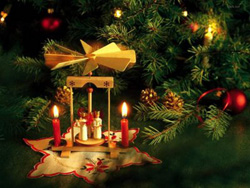
1 January - New Year's Day is the most favourite of all holidays in Ukraine. Decorating the Christmas tree, going to New Year's parties, giving and receiving gifts - we love all that and impatiently wait for New Year's Eve to come. As in Western countries on Christmas Eve, Ukrainians exchange "New Year" presents. Children find their presents under the New Year Tree on the morning of January 1st. Traditionally, just prior to midnight there's a Presidential address broadcast nationally. When the clock strikes Midnight, people pop open their Champaign bottles and raise their glasses. With the first glass they congratulate each other as the clock strikes 12 times and fireworks fill the sky. The last week of the year is a very busy one - with shopping, corporate parties, pine or fir- trees decoration, as well as cooking the year's most memorable meals. Ded Moroz (Father Frost) and his grand-daughter Snegurochka (The Snow Girl) are the patrons of this holiday.
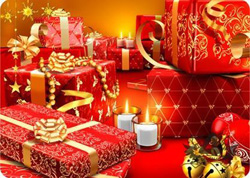
The tradition of fortune telling on New Year's Eve is very popular among Ukrainians, and especially the young ones. There is a peculiar tradition - writing down your wish for the coming year on a piece of paper, then dropping it into your glass of champagne and drinking it while the clock strikes 12 times. Another New Year's tradition practiced mainly in the villages is for the unmarried girls to go outside and throw one of their shoes over the fence. Whichever direction the toe of the shoe ends up pointing in indicates where the future husband will come from. As for the presents to get your family and friends for New Year's, the choice is unlimited -from really small gifts to very expensive ones. The most important thing when choosing a gift is to take into consideration each person's preferences.
7 January - Orthodox Christmas. The period of January 7- 14, is known as "Christmas week". During this week, a group of people go from house to house singing carols and wishing health and prosperity to each family. This custom is called "Kolyaduvannya" or "Schedruvannya" and the singers are usually dressed in traditional national costumes. The songs are called "kolyadky" and "schedrivky". When those singers visit somebody's home, the host should give them sweets, food, drinks, money or whatever you are willing to give as a token of appreciation. There is another similar tradition during the New Year's holidays - till the 14th of January kids and sometimes adults (especially in the villages) go from one house to another wishing their neighbours happiness, health, etc. All those wishes are usually being said in rhymes while at the same time the guests are spreading seeds, such as wheat or other grains.
14 January - Old Calendar New Year - is being celebrated as a family holiday. People finally see off the old year and welcome the new one. There is a traditional dinner for families and friends who exchange presents on this day as well.

14 February - St. Valentine's Day has been adopted from the Western culture and today is one of the most popular holidays in Ukraine.
8 March - The International Women's Day is considered the first of all spring holidays in Ukraine. It is a non-working day, celebrating the economic, political and social achievements of women. It originated as a day celebrating women's fight for rights as on March 8, 1897 women workers gathered in New York demanding a 10 hour working day, brighter and dryer work places and equal salaries with men. In 1910 at the International Conference of Women Socialists in Copenhagen, Clara Tsetkin proposed celebrating the International Women's day on March, 8th which was meant as an appeal to all women to join in the struggle for equality around the world. The International Women's day had been a State Holiday of the Former Soviet Union. After the disintegration of the Soviet Union, March 8th remained on the list of State Holidays in nearly all of the CIS countries. On this day mothers, grandmothers, sisters, daughters, wives and girlfriends receive lots of flowers, cards and gifts.
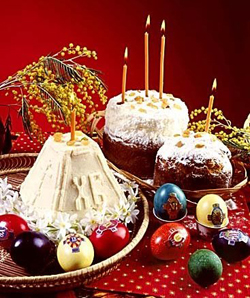
Easter is a very important holiday in Ukraine. The date is usually determined by the Church calendar. Before and during Easter holidays Ukrainians buy or bake Easter cakes (pastries with raisins) and paint eggs, widely known as Pysanka. On Easter night people go to their local church, spending the entire night listening to Church services! Usually they take with them Easter cakes, hand painted eggs, and bottles of wine. In the morning (about 4 am) the service concludes with the clergyman sprinkling the food with holy water, which is believed to have healing powers. At this time people return home to continue celebrating. The traditional greeting on this day is: "Chrystos Voskres!" (Christ is risen) and the answer is "Voyistynu Voskres!" (Indeed, He is risen) followed by kisses and exchanging of gifts.
50 days after Easter - Holy Trinity Day (Svyata Troyitsya)(or "Green Sunday") This holiday is dedicated to the descent of the Holy Spirit upon the Apostles on the fiftieth day after the Resurrection of Christ (Easter). This event is believed to have given rise to Christianity. On Holy Trinity Day people go to the cemeteries to visit the tombs of relatives and friends who have passed away. There is a custom of leaving food on the burial tombs of loved ones. Traditionally people leave some vodka or other alcohol and something to eat along with it, such as a piece of bread or candy. It is considered a good sign to find that the food and drinks have disappeared upon your next trip to the cemetery! Holy Trinity Day is a very important religious holiday in Ukraine.
1 - 2 May - Labor Day (May Day) is a celebration of the social and economic achievements of the international labour movement. During the 19th century Industrialization, May Day has become International workers' day. Usually it is celebrated with elaborate parades all over the country.
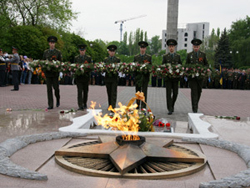
9 May - Victory Day. This is a holiday of both joy and sorrow. A great tribute is bestowed to those who died during World War II in the name of freedom and peace. The eternal memory of those people will always be honoured. On this day, war veterans gather together remembering those who perished. Every city has a monument, called "The Eternal Fire", where people gather on May 9. In Kyiv it is located near the famous WWII museum and the "Motherland" Statue and Monument. There are usually concerts devoted to this holiday.
13 May - Mother's Day. On this day Ukrainians express their love, respect, and appreciation to their Mothers. It is common to give lots of flowers, sweets and other gifts to women.
1 June - International Children's Day. This holiday is simply set to honour children and minors and their rights for life and dignity, which must be respected and defended. Children are happy when they are loved, fed, taken care of and being understood. A lot of concerts, shows and games are being organised on this day. Parents usually buy small presents for their children. 24 June - Youth Day. Youth is celebrated on this day - with a lot of fun, fireworks and concerts! 28 June - Constitution Day. The Constitution of Independent Ukraine was adopted on this day in 1998. Fireworks and various musical events are common throughout the country.
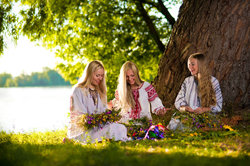
6 July - Ivan Kupala Day, which celebrates the "God of the Sun" is one of the nicest and most enigmatic holidays. This is a Slavic celebration of ancient pagan origin marking the end of the summer solstice and the beginning of the harvest It is believed that around the summer solstice, the sun is at its strongest. They say that as the Sun is a personification of light, every time when it rises, the light defeats the dark powers. So, on this day we celebrate the victory of light over dark forces, when all Nature feels revived, jolly and charmed. Youth, beauty, love and purification are being celebrate on Ivan Kupala Day. Kupala eve is a very special time. Magical properties are being ascribed to the plants and herbs gathered on Kupala eve. It is believed that such herbs could protect one from the evil forces of nature and even cure illnesses. On the morning of that day girls washed themselves with the dew that had fallen on Kupala eve, which they collected in a bowl left outside overnight, and ran barefoot through the bedewed fields in the belief that doing so would accelerate their opportunity to get married. The sick would roll naked in the dewy meadows in the belief that this action would help them get well, and farmers would run their cattle through such meadows in the belief that this routine would prevent disease.
24 August - Independence Day is Ukraine's biggest State holiday, which commemorates the adoption of the "Declaration of Sovereignty" of Ukraine in 1990. Impressive fireworks and memorable concerts are being organised throughout the capital Kyiv and the rest of the country.
1 September - The Day of Knowledge. This holiday is also called "The Day of Open Doors" and it celebrates the beginning of the school year at all Schools, Colleges, Universities and Institutes. After the summer break, all students are going back to the "Land of Knowledge". The day starts with celebrations in the school yards with nicely dressed students carrying flowers for their teachers.
October 5 - Teacher's Day. This special day was created to focus the World's attention on the contributions and achievements of teachers as well as their concerns and priorities. Teachers receive special appreciation for all the hard work they do. Students usually give flowers and small presents to their teachers.
6 December - Ukrainian Army Day. In 1991 the Decree regarding the establishment of the" Armed forces of Ukraine" was signed and is annually celebrated on December 6.
19 December - St. Nicholas Day. On this day parents and relatives try to surprise their kids by placing small gifts, toys, sweets or books into symbolic shoes or stockings or even under their pillows. St. Nicolas is the patron saint of children, students, sailors, merchants and archers. St. Nicholas day is the first of the winter holidays. Every child who has behaved during the year receives a gift from St. Nicolas on this day.
|

